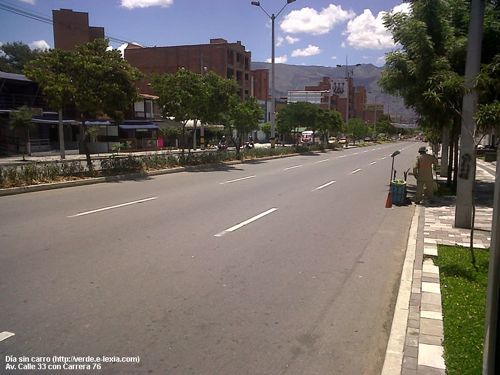On April 22, the city of Medellín celebrated the Day Without Cars, which is an initiative approved by the Municipal Council Agreement 21 of 2008. This event demonstrates a reflection based on the idea of caring for the environment and coincided with the celebration of Earth Day.
As stated in the blog Movilidad al Día [es], the “Day Without Cars” was an initiative not only celebrated in Medellín, but many cities around the world. The blog also discussed the goals proposed by Medellín's Municipal Administration for taking part in the event:
Este acuerdo municipal (21 de 2008 del Concejo de Medellín) se propuso los siguientes objetivos: disminuir en los niveles de contaminación ambiental producida por ruido y gases contaminantes emitidos por vehículos automotores; reducir el índice de accidentalidad vial en la ciudad; contribuir con el mejoramiento de la movilidad del transporte público; sensibilizar a la ciudadanía sobre la problemática asociada con el reducido uso del transporte público; promover alternativas de desplazamiento particular y masivo menos traumáticas para el ambiente; generar pedagogía social en torno a la protección del medio ambiente, el uso adecuado de los recursos naturales, la seguridad vial y la salud, como obligaciones fundamentales de corresponsabilidad ciudadana.
According to E-Verde [es] an environmental blog, this year's event expanded to other municipalities outside of the metropolitan area of Medellín, including Envigado, Bello, and Itagüí.
The blog En Journalism 999 [es], Heidi Yohana Tamayo Ortiz writes about the advantages and disadvantages of the Day Without Cars:
There was an impact on the parking lots or sites that watch over cars:
“En un día normal, aquí se hace aproximadamente un millón de pesos; hoy, se han hecho máximo 40 mil pesos”, dice Luis Alfonso Ríos Villa, empleado del Parqueadero Nuevo Centro La Alpujarra.
What about the effect that it had on public transport drivers?
Pese a lo que se pensaba, para los conductores de buses y colectivos el trabajo no tuvo variaciones significativas; de hecho, algunos piensan que el día laboral estuvo más malo que en otras ocasiones.
The impact on taxi drivers:
Los taxistas fueron, tal vez, unos de los más beneficiados durante el día. Según cifras proporcionadas por Marta Suárez, subsecretaria de Transportes y Tránsito, la empresa Tax Individual reportó que recibieron llamadas de 13.800 usuarios pidiendo un servicio, mientras que en un día normal, solo se reciben siete mil. Las otras empresas reportan datos similares.
How did transport organizations view the event?
“En términos generales, la mayoría de la gente acató la medida. Sin embargo, faltaron unos cuantos. Las personas a las que se les aplicó comparendo pedagógico dicen que no tenían conocimiento de la medida, pero me parece raro, ya que esto fue muy difundido en los medios de comunicación,” dice Rosenberg Ríos Aguirre, supervisor del tránsito de Medellín.
There were also those people who did not follow the day's regulations:
Aquellas personas que no se acogieron a la medida deben asistir a una capacitación pedagógica, cuyo tema será el medio ambiente. En unos quince días se habilitarán seis locaciones para que se dicten las charlas. Quienes no asistan serán sancionados con multas económicas.
Twitter user Tips El Colombiano (@tips9333) wrote about how the day was spent by one family (with picture):
Esta familia fue más allá en el día sin carro: papá y mamá llevaron a caballo a los hijos para el colegio.http://yfrog.com/11e23mmj
Finally, Juan David Escobar of the blog Reticente [es], shares his thoughts A “Medellín on the Day Without Cars”








2 comments